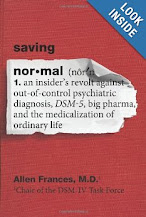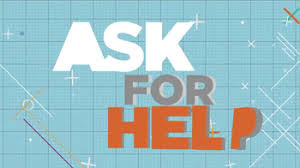- Racism is not a mental illness; racism is a sin.
- White nationalism is not a mental illness; white nationalism is a sin.
- Violence is not a mental illness; violence is a sin.
- Hatred is not a mental illness; hatred is a sin.
Okay, the Christian in me is coming out here when I say sin. And even some Christians have trouble using that word these days. Which is fine. Don't use it if you can't sort out sin from all the baggage it carries.
But for the love of God and your neighbor, don't substitute mental illness to explain the appalling image of the latest white guy with his racist manifesto and his swastika painted on his semiautomatic weapon shooting up the Dollar General, or the supermarket, or the bible study.
Use the word wrong if you can't bring yourself to say sin. Wrong doesn't seem strong enough, I understand that. But explaining these events as mental illness is REALLY wrong on two levels.
Ignoring the Evidence about Mental Illness
First, mental illness does not correlate with violence.
Let me say it again for the people in the back of the room.
Mental illness does not correlate with violence.
Sure, journalists will go digging into the background of the latest shooter. And journalists will find that the shooter had some previous contact with mental health services. The American Journal of Public Health article by Sherry Glied and Richard G. Frank explains this phenomenon:
The journalist’s search for a mental illness explanation of aberrant acts will almost always succeed. Epidemiological research suggests that nearly half the population—whether or not involved in crime—experience some symptoms of mental illness over the course of their lifetimes. The most recent population estimate of the lifetime prevalence of major mental illnesses meeting diagnostic criteria among US adults is 46%, and 9% meet criteria for a personality disorder.1,2 Seeking mental health treatment is hardly less common: the literature suggests that about one fifth of the US population report seeking professional care for a mental health problem in a year and nearly one third do so over their lifetimes.3
The very high lifetime prevalence of illness and treatment seeking helps explain why virtually every story of a violent act can be linked to some clues of psychological abnormality or mental health treatment—even though the rate of violent behavior of any type among people who meet diagnostic criteria for mental illnesses is estimated to be only about twice as high as the rate among those who never experience a mental illness.3–5 Mental illness is simply not a very specific predictor of violence.
People with serious mental illness are only twice as likely to commit violence than the general population. Which means that they commit 4% of violent crime. 4%.
It is wrong, it is incorrect to explain violence by mental illness.
Why does the myth persist, contrary to the evidence? Because having rejected the concept of sin, we can't figure out why these things happen, unless something is wrong with their heads. But that explanation is wrong, as in incorrect.
Indeed, there is something wrong in their heads. But it is not mental illness.
- Racism is not a mental illness.
- White nationalism is not a mental illness.
- Violence is not a mental illness.
- Hatred is not a mental illness.
Making Mental Illness Illegal
Blaming mental illness for violence is wrong in a second way. It is harmful, hateful, and dangerous.
Harmful, hateful, and dangerous.
Liberals repeat the myth of violence caused by mental illness to support funding for more services for the mentally ill (which never are forthcoming). Conservatives repeat the myth to push back against gun control (without allowing any restrictions, even for those they claim to be violent). Both liberals and conservatives, both liberals and conservatives create scapegoats of vulnerable people.
Here is what a candidate for president of the United States tweeted, repeating his answer to the violence question in the recent GOP debate:
Don’t remove guns from law-abiding citizens. Remove violent, psychiatrically deranged people from their communities and be willing to involuntarily commit them. Revive mental health institutions: less reliance on pharmaceuticals, more reliance on faith-based approaches that restore purpose to people’s lives. We know from the 1990s how to stop violent crime. The real question is if we have the spine to do it.
That this candidate has low polling numbers does not undo the damage he does by calling us violent and deranged. He makes such discourse seem reasonable.
On the other end of the political spectrum, both California and New York City politicians are endorsing forced institutionalization and treatment of people with serious mental illness, even for those who do not pose an immanent threat to themselves or others.Forced institutionalization may look like compassion. It is a violation of civil liberties. It makes mental illness illegal.
Where will these forcibly institutionalized people be housed? The latest figures for all types of psychiatric inpatient settings are from 2014, when there were 170,000 beds available. However, that figure includes VA and private hospitals. State capacity, where those who are hospitalized by the state go, is 35,000 beds.Where are the mentally ill really housed? According to a recently released federal Bureau of Justice Statistics (BJS) report, 1.25 million of them are in prison, where they do not fare well. According to this report:
Prisoners with mental illness find it more difficult to adhere to prison rules and to cope with the stresses of confinement, as evidenced by the new BJS statistics that 58 percent of state prisoners with mental problems have been charged with violating prison rules, compared to 43 percent without mental problems. An estimated 24 percent with a mental health problem have been charged with a physical or verbal assault on prison staff, compared to 14 percent of those without. One in five state prisoners with mental health problems has been injured in a fight in prison, compared to one in 10 of those without.
Prison staff often punish mentally ill offenders for symptoms of their illness, such as being noisy, refusing orders, self mutilating or even attempting suicide. Mentally ill prisoners are thus more likely than others to end up housed in especially harsh conditions, including isolation, that can push them over the edge into acute psychosis.
The Bigger Picture - Making Homelessness Illegal
“The man standing all day on the street across from the building he was evicted from 25 years ago waiting to be let in; the shadow boxer on the street corner in Midtown, mumbling to himself as he jabs at an invisible adversary; the unresponsive man unable to get off the train at the end of the line without assistance from our mobile crisis team: These New Yorkers and hundreds of others like them are in urgent need of treatment and often refuse it when offered,” the mayor said.
...Mr. Adams has received criticism from some progressive members of his party for clearing homeless encampments and for continuing to push for changes to bail reform that would make it easier to keep people in jail. The mayor has defended his focus on public safety and has argued that many New Yorkers do not feel safe, particularly in Black and Latino neighborhoods.
Connect the dots. From homeless to mentally ill to dangerous to better off incarcerated, one way or the other.
The Myth Will Not Make You Safe
My friends, you can put another 1.25 million of us loonies in jail. That young man will still be stalking the streets who lives with his white middle class parents in their suburban home with an arsenal in the basement. You will have done nothing to protect our schools, our shopping centers, and our bible studies.
So stop it.
Racism is not a mental illness; racism is a sin.

































